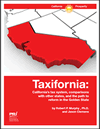
As the bad memory of April 15 fades, my fellow Tennesseans may be curious to know how our state compares to others in terms of taxes. The good news centers on the methods state and local governments take to extract revenue. Here, at least, we fare quite well compared to most Americans.
Indeed, Tennessee is sixth-best in the nation, according to a newly released study from the Pacific Research Institute that I co-authored. In particular, Tennessee gets high marks for its lack of an income tax, except on dividends and interest. In fact, the reason I came to Tennessee was its tax structure.
Overall tax burden too high
Several years ago, I moved from New York City to work in the investment firm of Arthur Laffer, who relocated to Nashville from California because of that state’s stifling taxes. One of his conditions was that his offices be in a state with no income tax. Now that I am on my own, I can see the benefits firsthand.
Tennessee also features a relatively low corporate income tax burden and low property tax receipts relative to the size of the state’s economy. The bad news: Tennessee’s overall tax burden is too high, and state politicians spend too much. After netting out the flows to and from the federal government, state and local government spend more than 16 percent of the state’s entire economic output. This is above the norm; there are 30 other states with smaller drains on their citizens’ resources.
Tennesseans must realize that when state and local governments spend money, such action, by itself, doesn’t make the state richer. That money had to come from somewhere.
For example, the Music City Center, the new convention center in downtown Nashville, states on its website that total expenditures were $80.7 million through March, with projected expenses of more than $600 million before the project is completed. These revenues will come from earmarked taxes and lines of credit.
The justification for the huge expenditure is that the center will bring in more tourists and boost tax collections, thus “paying for itself.” Yet, if that’s true, we have to ask why private venues aren’t also expanding. When politicians say they are savvier investors than people who have their own money on the line, taxpayers should be very suspicious.
State and local politicians are on the wrong side of the curve when it comes to their appetite for spending. By promising fewer goodies and sticking to traditional functions of government, Tennessee politicians would lighten the burden on all of us as we struggle through this painful recession.
TN tax structure helps, but state, cities spend too much
Robert P. Murphy
As the bad memory of April 15 fades, my fellow Tennesseans may be curious to know how our state compares to others in terms of taxes. The good news centers on the methods state and local governments take to extract revenue. Here, at least, we fare quite well compared to most Americans.
Indeed, Tennessee is sixth-best in the nation, according to a newly released study from the Pacific Research Institute that I co-authored. In particular, Tennessee gets high marks for its lack of an income tax, except on dividends and interest. In fact, the reason I came to Tennessee was its tax structure.
Overall tax burden too high
Several years ago, I moved from New York City to work in the investment firm of Arthur Laffer, who relocated to Nashville from California because of that state’s stifling taxes. One of his conditions was that his offices be in a state with no income tax. Now that I am on my own, I can see the benefits firsthand.
Tennessee also features a relatively low corporate income tax burden and low property tax receipts relative to the size of the state’s economy. The bad news: Tennessee’s overall tax burden is too high, and state politicians spend too much. After netting out the flows to and from the federal government, state and local government spend more than 16 percent of the state’s entire economic output. This is above the norm; there are 30 other states with smaller drains on their citizens’ resources.
Tennesseans must realize that when state and local governments spend money, such action, by itself, doesn’t make the state richer. That money had to come from somewhere.
For example, the Music City Center, the new convention center in downtown Nashville, states on its website that total expenditures were $80.7 million through March, with projected expenses of more than $600 million before the project is completed. These revenues will come from earmarked taxes and lines of credit.
The justification for the huge expenditure is that the center will bring in more tourists and boost tax collections, thus “paying for itself.” Yet, if that’s true, we have to ask why private venues aren’t also expanding. When politicians say they are savvier investors than people who have their own money on the line, taxpayers should be very suspicious.
State and local politicians are on the wrong side of the curve when it comes to their appetite for spending. By promising fewer goodies and sticking to traditional functions of government, Tennessee politicians would lighten the burden on all of us as we struggle through this painful recession.
Nothing contained in this blog is to be construed as necessarily reflecting the views of the Pacific Research Institute or as an attempt to thwart or aid the passage of any legislation.